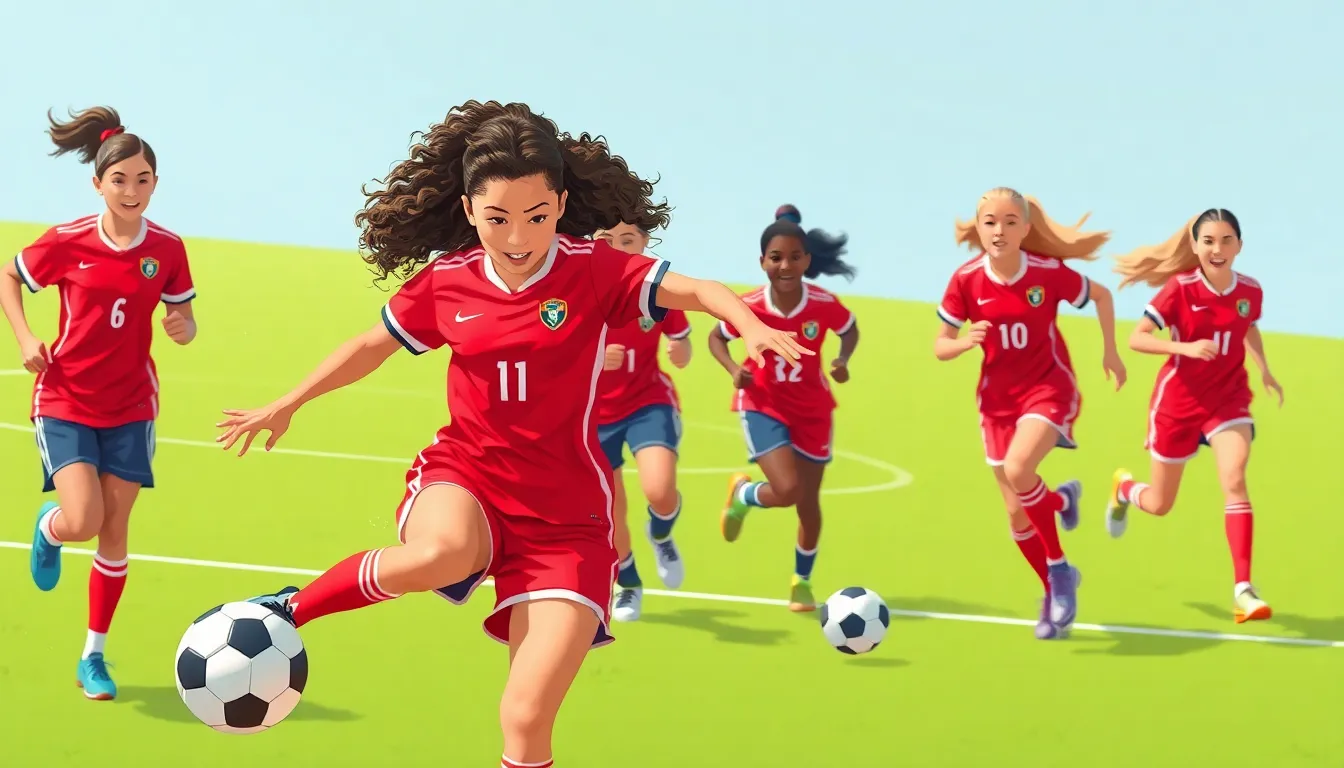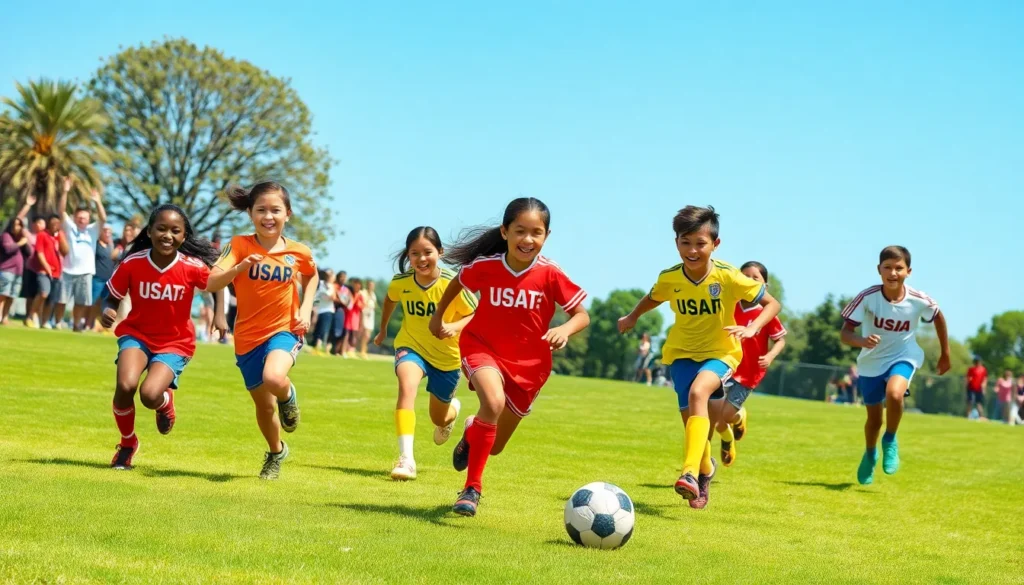Table of Contents
ToggleAmateur sports organizations are the unsung heroes of the athletic world, where dreams are chased and friendships are forged over sweaty jerseys and questionable snack choices. They provide a platform for athletes to showcase their skills, whether it’s a home run that would make Babe Ruth proud or a backflip that’s more tumble than triumph.
Overview Of Amateur Sports Organizations
Amateur sports organizations play a crucial role in the athletic landscape, providing structure and support for athletes of all ages. These organizations encourage participation in various sports, bridging the gap between enthusiasm and organized competition. With a focus on personal development, skill enhancement, and teamwork, they foster positive experiences in athletic endeavors.
Many amateur sports organizations serve local communities, promoting physical fitness and healthy lifestyles. Their activities often include training sessions, competitions, and social events that build camaraderie among participants. Additionally, they form partnerships with schools and local businesses, increasing resources for athletes.
Competitions organized by these entities range from local leagues to national tournaments. Events highlight talent and dedication while showcasing the passion that drives amateur athletes. Volunteers often support these operations, contributing time and expertise to ensure successful events.
Funding and sponsorship significantly impact the sustainability of amateur sports organizations. Many rely on grants, donations, and local business support to maintain facilities and provide equipment. Transparency in financial management fosters trust among participants and stakeholders.
Participation in amateur sports can lead to significant personal growth. Athletes develop skills such as leadership, determination, and resilience. Positive mentorship from coaches and experienced athletes encourages youth to pursue their goals both in sports and in life.
Amateur sports organizations contribute to community building and individual development. They create opportunities for engagement, foster relationships, and highlight the importance of sportsmanship. The dedication to supporting athletes of various skill levels solidifies their vital position within the sports community.
Benefits Of Participating In Amateur Sports

Participating in amateur sports offers numerous benefits that contribute to an individual’s overall well-being.
Physical Health Benefits
Engaging in amateur sports significantly enhances physical health. Participation improves cardiovascular fitness through regular aerobic activity. Strength training naturally occurs during sports, promoting muscle development and endurance. Individuals also experience weight management benefits as consistent physical activity burns calories. Flexibility and coordination improve with regular practice, reducing the risk of injuries. Furthermore, social interactions during sports encourage community involvement and active living, leading to an overall healthier lifestyle. Statistics show that individuals who participate in organized sports are more likely to engage in other healthy habits, illustrating a comprehensive approach to physical fitness.
Mental Health Benefits
Mental health benefits from participating in amateur sports are profound. Regular physical activity releases endorphins, which naturally elevate mood. Stress relief often occurs as athletes engage in activities that distract from daily pressures. Social connections forged through teamwork foster a sense of belonging, enhancing emotional well-being. Developing skills through training cultivates discipline and focus, positively impacting personal and professional endeavors. Research demonstrates that individuals involved in sports report lower levels of anxiety and depression, showcasing the mental health advantages of consistent engagement in amateur athletics.
Types Of Amateur Sports Organizations
Amateur sports organizations fall into several categories that support athletes and promote active participation. Each type plays a specific role within the broader athletic community.
Local Sports Leagues
Local sports leagues serve as grassroots organizations that facilitate community engagement through sports. These leagues focus on providing opportunities for youth and adults to compete, socialize, and develop skills. Each league typically organizes regular games and tournaments, fostering a sense of camaraderie among participants. Local leagues often rely on volunteers for coaching and administration, making them accessible to a wide range of athletes. By promoting inclusivity, these leagues encourage everyone regardless of skill level to participate, enhancing community ties and overall physical fitness.
National Governing Bodies
National governing bodies oversee specific sports at the national level, ensuring standardized rules and regulations are maintained. These organizations work to promote their sport across the country, organizing events, competitions, and coaching programs for athletes of all ages. National governing bodies often focus on athlete development, providing resources and support to improve performance. They also facilitate pathways for athletes to compete at higher levels, including international competitions. Through advocacy and funding, these organizations help ensure the sustainability of amateur sports, guiding the direction and growth of athletic programs nationwide.
How To Get Involved
Getting involved in amateur sports organizations offers opportunities to connect and grow. Various pathways exist for new participants and community members.
Finding An Organization
Locating an organization aligns with personal interests and community presence. Search local directories and community bulletin boards for sports leagues catering to various ages and skill levels. Explore social media platforms for announcements about practices, events, and open enrollments. Contact local schools and recreation centers as they often partner with amateur sports organizations. Attend local events to meet coaches, athletes, and volunteers, fostering connections that enhance participation. These connections frequently lead to discovering nearby teams and programs that support individual athlete development.
Volunteering Opportunities
Volunteering provides essential support to amateur sports organizations. Numerous roles exist, including coaching, event planning, and administration. Coaches help develop athlete skills, instilling values like teamwork and discipline. Event planners organize competitions and social events that encourage community engagement and team spirit. Administrative roles include managing registrations, finances, and communication. Volunteers enjoy the satisfaction of contributing to athlete success while cultivating personal growth through teamwork and leadership. Joining as a volunteer often creates lasting relationships within the sports community.
Challenges Facing Amateur Sports Organizations
Amateur sports organizations encounter several significant challenges that can hinder their effectiveness and growth. Understanding these challenges is critical for stakeholders aiming to support these organizations.
Funding Issues
Funding shortages create obstacles for many amateur sports organizations. Limited financial resources impede access to facilities, equipment, and coaching. A reliance on membership fees, donations, and sponsorships often leads to unstable funding streams. Only 30% of organizations secure sufficient sponsorship, which constricts budgeting for events and programs. Those lacking financial support struggle to maintain operations, affecting athlete participation and community engagement.
Inclusivity and Accessibility
Inclusivity and accessibility remain pressing challenges for amateur sports organizations. Many organizations strive to accommodate diverse populations, but barriers often exist. Financial constraints can limit participation for lower-income families. Additionally, facilities may not always have the necessary accommodations for athletes with disabilities, further hindering access. Organizations that prioritize inclusivity often report increased athlete engagement, fostering a sense of belonging within the community.
Amateur sports organizations play a pivotal role in shaping athletes and communities alike. They not only provide a platform for skill development but also foster lifelong friendships and personal growth. Through their commitment to inclusivity and community engagement, these organizations create opportunities for everyone to participate in sports.
Despite facing challenges such as funding shortages and accessibility issues, the dedication of volunteers and supporters ensures that amateur sports continue to thrive. By promoting healthy lifestyles and teamwork, these organizations contribute significantly to both individual well-being and community cohesion. The impact of amateur sports organizations extends far beyond the playing field, enriching lives and building a stronger, more connected society.







